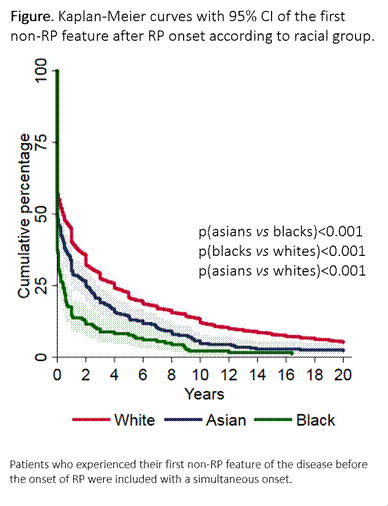Session Information
Session Type: ACR Poster Session B
Session Time: 9:00AM-11:00AM
Background/Purpose: Genetic and environmental factors play a significant role in SSc. African Americans are known for a higher SSc incidence, an earlier age of onset, and a greater prevalence of interstitial lung disease and pulmonary hypertension (PH) compared to white patients. Data on blacks mostly stem from African Americans and studies on Asians are mostly from outside Asia and lack direct comparison with other racial groups.
We aimed to further evaluate differences of SSc presentations between white, Asian and black patients.
Methods: Characteristics of self-reported white, Asians or black SSc patients from the EUSTAR cohort were compared across racial groups; cox/logistic regression analyses were adjusted for age, sex, disease duration and antibody status.
Results: 9161 white, 341 Asian (208 patients from within, 133 from 34 centres outside Asia) and 198 black patients (82 patients from within, 116 from 35 centres outside sub-Saharan Africa [SSA]) were included.
Asian and black patients were on average 10 years younger than white patients (p<0.001). Black patients developed the first non-Raynaud’s phenomenon (RP) SSc feature faster than Asian and white patients (all p<0.01; Figure) also after adjustment (HR [blacks] 1.4, p<0.001; HR [Asians] 1.1, p=0.009 vs whites). Asian patients treated within Asia (China) developed the first non-RP comparably to Asian patients treated outside Asia (HR [within Asia] 1.09, p=0.48). Black patients treated within SSA (South Africa) had a slightly faster disease onset than those treated outside SSA (HR [within SSA] 1.16, p=0.37).
Among ANA specificities, ACA predominated in white patients (whites: 42%, Asians: 16%, blacks: 10%; p<0.001) and anti-Scl-70 in Asian patients (whites: 35%, Asians: 47%, blacks: 34%; p<0.001). The prevalence of diffuse skin involvement was similar in Asian (28%) and white patients (26%), but more common in black patients univariately (56%; p<0.001) and multivariably (OR [Asians] 0.7, p=0.06; OR [blacks] 2.7, p<0.001 vs whites).
The prevalence of PH (defined as PAPsys>40mmHg as estimated by echocardiography) was lower in white patients (whites 12%, Asians 18%, blacks 17%; p=0.004; OR [Asians] 2.6, p=0.001, OR [blacks] 2.8, p=0.020 vs whites). Asians had a higher prevalence of an impaired diffusing capacity for carbon monoxide (<80% of predicted; 84%) than black (74%) or white patients (70%, p<0.001) also in multivariable analysis (OR [Asians] 2.4, p<0.001; OR [blacks] 1.2, p=0.55 vs whites). Both, Asians (44%) and black patients (50%), had a higher prevalence of a reduced forced vital capacity (<80% of predicted) compared to white patients (23%, p<0.001) univariably and multivariably (OR [Asians] 2.5, p<0.001; OR [blacks] 2.4, p=0.002 vs whites).
Conclusion: Our analysis replicates the known clinical and serological differences between black and white patients and suggests that Asians have high prevalences of anti-Scl-70, PH and lung involvement.
To cite this abstract in AMA style:
Jaeger VK, Siegert E, Hachulla E, Airò P, Valentini G, Matucci-Cerinic M, Distler O, Cozzi F, Allanore Y, Li M, Tikly M, Walker UA. Racial Differences in SSc Disease Presentation: A Cross-Sectional European Scleroderma Trials and Research Group Study [abstract]. Arthritis Rheumatol. 2018; 70 (suppl 9). https://acrabstracts.org/abstract/racial-differences-in-ssc-disease-presentation-a-cross-sectional-european-scleroderma-trials-and-research-group-study/. Accessed .« Back to 2018 ACR/ARHP Annual Meeting
ACR Meeting Abstracts - https://acrabstracts.org/abstract/racial-differences-in-ssc-disease-presentation-a-cross-sectional-european-scleroderma-trials-and-research-group-study/

